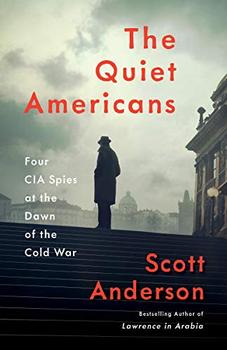Summary | Excerpt | Reviews | Beyond the Book | Readalikes | Genres & Themes | Author Bio

Four CIA Spies at the Dawn of the Cold War--A Tragedy in Three Acts
by Scott Anderson
This was a distinction lost on most of his future CIA associates. To them, Frank Wisner seemed the very epitome of the Southern gentleman—his colleagues invariably remarked upon his politeness and good manners, his soft rounded drawl—and, as a result, often ascribed stereotypes to him which didn't really apply.
Perhaps the most inapt was the stereotype of Southerners being laid-back, even a bit slow. Much to the contrary, by his adolescence, Wisner seemed propelled by a kind of edgy anxiety, the need to prove something to himself and to others. Along with being quite small for his age, he suffered a series of childhood illnesses that left him bedridden for weeks or even months at a time. This was undoubtedly an enormous worry to his parents—they had lost two children in infancy prior to Frank, and would lose another afterward—and might easily have resulted in a cosseted youth. Instead, these frailties appeared to spur a fierce self-discipline. On his college track team at the University of Virginia, Wisner was such a standout sprinter and broad jumper that he was invited to try out for the American Olympic team. "And that's where you see the conservativeness of the family come in," said Graham Wisner, the youngest of Wisner's three sons. "My dad was, I don't know, maybe the second or third fastest runner in the country, but his father said no. 'A gentleman does not do athletics when he should be going to law school and starting a career. A gentleman is serious.' "
Wisner obeyed his father's dictate, and instead turned his fire-at-the-heels sensibility to academics. After receiving his undergraduate degree at Virginia, he went on to its law school, one of the most demanding and select in the nation. There, he sat on the Law Review, finished third in his graduating class, and was inducted into UVa's most exclusive secret club, the Seven Society. To the surprise of no one, within weeks of his graduation in 1934, the newly minted attorney was hired on by a prestigious Wall Street law firm, Carter Ledyard.
At that juncture, it seemed Frank Wisner was determined to check off all the requisite boxes that marked the rites of passage of the successful, if utterly conventional, American man—albeit to do so a bit faster than most. Two years after he joined Carter Ledyard, he married his girlfriend, Mary "Polly" Ellis Knowles. Moving into a spacious apartment on Manhattan's East 57th Street, the couple soon had the first of what would ultimately be four children. By 1938, the twenty-nine-year-old corporate lawyer—most of his work was for the American Express Company—was already highly regarded in the tightknit Wall Street legal community, and well on his way to becoming a Carter Ledyard partner.
"He came up with very defined parameters of his own behavior," Graham Wisner explained. "This is what men of his class, of his time, did, what was expected of them."
And yet, for all his life's ease and privilege, it somehow didn't satisfy. Always keenly interested in politics and world affairs, Wisner closely monitored the march to war in Europe and, after the fall of France to the German war machine in 1940, became convinced the United States would eventually intervene. But "eventually" wasn't a word that sat well with the hard-driving lawyer; in early 1941, he told his startled Carter Ledyard colleagues of his plan to take a leave of absence from the firm and join the Navy. No doubt those colleagues tried to talk him out of the idea—after all, Wisner had a wife and now two young children to support—but instead, and under the weight of his considerable persuasive skills, ended up writing Wisner glowing letters of recommendation.
By that spring, the lawyer from Mississippi had received his naval commission—lieutenant, junior grade—and was assigned to the New York branch of the Office of Naval Intelligence, or ONI. He was there when Pearl Harbor was attacked that December.
Excerpted from The Quiet Americans by Scott Anderson. Copyright © 2020 by Scott Anderson. All rights reserved. No part of this excerpt may be reproduced or reprinted without permission in writing from the publisher.
Your guide toexceptional books
BookBrowse seeks out and recommends the best in contemporary fiction and nonfiction—books that not only engage and entertain but also deepen our understanding of ourselves and the world around us.